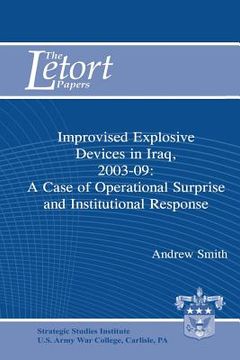Share
Improvised Explosive Devices in Iraq, 2003-2009: A Case of Operational Surprise and Institutional Response: Letort Paper (in English)
Andrew Smith
(Author)
·
Createspace Independent Publishing Platform
· Paperback
Improvised Explosive Devices in Iraq, 2003-2009: A Case of Operational Surprise and Institutional Response: Letort Paper (in English) - Smith, Andrew
$ 12.79
$ 15.99
You save: $ 3.20
Choose the list to add your product or create one New List
✓ Product added successfully to the Wishlist.
Go to My WishlistsIt will be shipped from our warehouse between
Friday, June 21 and
Monday, June 24.
You will receive it anywhere in United States between 1 and 3 business days after shipment.
Synopsis "Improvised Explosive Devices in Iraq, 2003-2009: A Case of Operational Surprise and Institutional Response: Letort Paper (in English)"
"Surprise" is a familiar term in military writings: the achievement of tactical surprise has such obvious benefits that it is enshrined in the military doctrine of most nations. Surprises that emerge in tactics, however, can also operate at the strategic and operational levels. These surprises are particularly dangerous, because they can test the relevance and adaptability of military forces and the "institutional" defense establishments that create, develop, and sustain them. A military establishment that is too slow to recognize and respond to such surprises places its nation's interests at grave risk. In the bipolar strategic environment of the Cold War, deep knowledge of a known adversary reduced the likelihood of such surprises. The same is not true now. This monograph thus comes at an important time, as Western nations contemplate major reductions in defense spending with consequent limitations on force structure. The range of enemy capabilities that a force will be able to match, qualitatively and quantitatively, will become smaller; hence the potential for operational and strategic surprise will increase. In this monograph, Brigadier Andrew Smith uses the improvised explosive device threat as it manifested itself in Iraq between 2003 and 2009 as a case study of such a surprise and how defense establishments responded to it. He argues that, although tactical in itself, this threat posed an operational and strategic threat in a modern "war of discretion" that demanded institutional responses from both the U.S. and Australian institutional militaries, including major equipment, training, and budgetary changes within iv time frames that circumvented the normal peacetime force development cycles of those countries. There are disappointments in the way both countries met this challenge. A key conclusion from this analysis is the critical role of strategic leadership in recognizing the scale of surprise and in forcing the necessary institutional response. At a time when budgets will not allow surprise to be addressed by maintaining large and technically diverse forces at high readiness, the ability to recognize and respond adroitly to operational and strategic surprise may be a critical requirement for a modern defense establishment.

